The African Continental Free Trade Agreement (AfCFTA) provides a blueprint for the continent to overcome development challenges through intra-African trade that is economically and environmentally sustainable. On this episode of Foresight Africa, host Landry Signé talks with AfCFTA Secretary–General Wamkele Mene, who shares his vision of how the world’s largest free trade area can address Africa’s development needs with African solutions.
- Subscribe to Foresight Africa on Apple, Spotify, Afripods, or wherever you listen to podcasts.
- Listen to previous episodes.
- Watch episodes on YouTube.
- Learn about other Brookings podcasts from the Brookings Podcast Network.
- Sign up for the podcasts newsletter for occasional updates on featured episodes and new shows.
- Send feedback to [email protected].
Transcript
[music]
SIGNÉ: Hello, I am Landry Signé, senior fellow in the Global Economy and Development Program and the Africa Growth Initiative at the Brookings Institution. Welcome to Foresight Africa podcast, where I engage with contributors to our annual flagship Foresight Africa report and influential leaders in policy, business, academia, and civil society. My distinguished guests share their unique insight and innovative solutions to Africa’s most complex development challenges, while highlighting the continent’s opportunities to advance impactful engagements between Africa, the United States, and the global community as we approach the deadline for the Sustainable Development Goals in 2030. You can learn more about this show and our work at Brookings dot edu slash ForesightAfricaPodcast.
Today on the podcast, I welcome the Secretary General of the African Continental Free Trade Area, His Excellency Wamkele Mene. Prior to being elected Secretary-General of the African Continental Free Trade Area, AfCFTA, and I should say twice, he served as chief director of Africa Economic Relations at the Department of Trade and Industry of South Africa and was deputy ambassador at the South African Permanent Mission to the World Trade Organization. He has written and lectured internationally on international trade law, international investment law, and international business law.
Thank you so much for joining the podcast today, Your Excellency.
MENE: Thank you very much, professor, for the invitation. I’m happy to be with you. I look forward to our conversation.
SIGNÉ: Fantastic! You have had an incredible and accomplished career in global and regional trade marked by many successes. What initially inspired you to pursue this path, Excellency?
[2:48]
MENE: Well, I’ve always been motivated by the opportunity to make impact and the opportunity to shape the beloved continent of Africa into a direction and into something that all of us can be very proud of. I grew up under apartheid South Africa. I have very, very vivid and clear memories of the injustices of underdevelopment, which was of course deliberate, of economic deprivation, as well as the indignity that comes with poverty. And so I am motivated by the desire to make my small contribution to advance Africa’s economic development, to create opportunities for young people, and to ensure that our continent takes its rightful place in the community of nations.
SIGNÉ: Fabulous, Excellency! The AfCFTA is the world’s largest free trade agreement by the number of participating countries. For the audience members who may not be as familiar with the AfCFTA, could you briefly explain what it is, key moments and statistics, and where it currently stands in the implementation process, Excellency?
[4:21]
MENE: The AfCFTA is really a remarkable achievement for the African continent. In May 1963, the founding mothers and fathers of the Organization of African Unity had a vision, a vision of a single market in Africa, a single currency, a single central bank, a continental payments platform, all of these things was a vision that they set out when they established the Organization of African Unity.
You fast forward to 2025, that vision is becoming a reality, where today, as you and I speak, there are 48 countries that have ratified the agreement establishing the AfCFTA. Which means that these 48 countries have accepted, negotiated, and accepted the obligation to reduce and eliminate intra-Africa barriers to trade, intra-Africa barriers to investment, and to ensure that we increase intra-Africa trade.
It is a very, very comprehensive trade agreement with a high level of ambition in terms of depth of liberalization. The level of ambition is very, very high and it has to be high because of the character of Africa’s economy. And thus far, the character of Africa’s economy has been smallness of national economies, 42 currencies, a shallow industrial development capacity, and then over reliance on the export of primary commodities that are unprocessed. All of these combined have contributed to Africa’s underdevelopment.
The AfCFTA is intended to be a tool to reverse all of that, leveraging on the market of 1.4 billion people. And so the ambitious project of creating a single market is on track. Trade is happening under the rules of the AfCFTA. As I said earlier, it is a very remarkable achievement, not an easy achievement given that there are 55 countries, we’re negotiating this agreement, we’re pulling in different directions. But I’m very, very happy that under the leadership of our heads of states, we have achieved remarkable progress in a very, very short space of time.
SIGNÉ: This is impressive, Excellency. In the piece you’ve wrote for this year’s Foresight Africa report, you discuss many ways in which the AfCFTA provides opportunities for the continent to overcome some of its most pressing challenges. In particular, you highlight how the agreement provides an avenue for economic and environmental sustainability. In what ways has the agreement already begun to advance sustainability goals on the continent, Excellency?
[7:37]
MENE: As a starting point in answering your question. I should say that there is a very, very strong correlation between sustainability goals and the goals of the AfCFTA. And fundamentally, it is to push back on the frontiers of poverty and advance economic development on our continent using a range of different tools, at least from the perspective of the African Union, and the AfCFTA is one of those tools.
In respect of sustainability, we have set out a roadmap for how the continent of Africa must be industrialized by focusing on value-added production, value-added production that will enable the export of manufactured goods intra-Africa. And the rules that have been designed are specifically intended for that purpose of facilitating Africa’s capacity, enhancing Africa’s productive capacity.
Of course, the primary concern that we have to apply ourselves to is climate change. And so, as we implement a very ambitious project of a continental market integration, we have to be aware of environmental imperatives. And that is why in the agreement establishing the AfCFTA, there is a very clear commitment to trading in environmentally sound goods, to ensuring that the production, the manufacturing that takes place in Africa, that it is environmentally sustainable.
And in fact, we have gone even beyond the mere codification of those objectives at law in the agreement where we commit to trade in environmentally friendly goods and services, we have gone beyond that. We have established a link and are working with the Africa Green Industrialization Initiative on the back of implementation of the AfCFTA, and the Africa Green Industrialization Initiative is led by the president of Kenya to ensure that we do not compromise on our environmental imperatives whilst at the same time we are driving industrial development on the African continent.
We see the two as not mutually exclusive, that you can have a trade agreement that focuses on industrial development, accelerating productive capacity, but at the same time being very, very conscious of our environmental imperatives. And so we have a very unique opportunity to demonstrate to the world that industrialization does not necessarily have to negatively impact on environmental sustainability.
And so we look forward to working with partners around the world, for example, with investors, those who may want to invest within the framework of the AfCFTA, to invest in green industrialization, in green trade, in solar, in hydrogen, all of these different areas of renewable energy that offer opportunities to power and drive industrial development in Africa, whilst at the same time supporting and enhancing intra-Africa trade.
SIGNÉ: Fantastic, Excellency! And how might the emerging global trade landscape affect the implementation, acceptance, utilization of, and need for the AfCFTA?
[11:19]
MENE: There are three events that compel us as Africans to accelerate implementation of the AfCFTA. The first event was COVID-19, where of course the disruption of global supply chains placed the continent of Africa in a very untenable position. We did not have access to global supply chains that would have enabled us to overcome the COVID-19 pandemic much faster. We learned a lesson that we must establish our own self-sufficiency in terms of supply chains and productive capacities, particularly in respect of pharmaceuticals, and in particular in respect of vaccines and therapeutics. That’s the first event.
The second event that compels us to think very, very deeply about how we accelerate this agreement is the geopolitical context between Russia and Ukraine. Africa is a net importer of food. We import over $50 billion worth of food annually. We import from Russia, Ukraine a disproportionate amount of grains relative to the population of Africa. This was not a good position to be in, a continent of 1.4 billion people being affected by a conflict in another part of the world in terms of food security. So, we learnt a lesson. And that is, how do we use trade rules to ensure Africa’s food security? In this case, the trade rule that is applicable is the AfCFTA. How do we deploy that trade instrument to ensure Africa’s food security?
The third lesson that compels us, in my estimation, is the current context of increased trade protectionism, of increased investment protectionism, of narrow economic nationalism. It compels us, the weaponization of trade policy is compelling us to reflect very deeply about how we can accelerate the self-sufficiency as a continent that I referred to.
And so in my view, these three events have actually presented a crisis, which at the same time is an opportunity for us as Africans to pull ourselves up by our bootstraps, to create a domestic market—by domestic market, I mean the AfCFTA market—to create a domestic market that will ensure the self-sufficiency of our continent.
SIGNÉ: Fabulous, Excellency. You have worked closely with the World Economic Forum and co-launched the Forum Friends of the African Continental Free Trade Area. Last year at Davos, in partnership with the AfCFTA, the World Economic Forum introduced an action plan to accelerate global business and investment in Africa. Could you elaborate on the key sectors, strategy, and actions aimed at engaging the private sector and driving Africa’s trade and industrialization, Excellency?
[14:48]
MENE: We have a very strong partnership and I’m very grateful to the World Economic Forum for the partnership. We started in 2023, where we published the report, which provides an overview of the AfCFTA market to global investors. We identified four priority sectors: agriculture, automotive sector, pharmaceuticals, transport, and logistics. And we put to investors a value proposition of investment that combined these four sectors present a market of 150 billion dollars for investors to invest in and to see commercially priced returns on their investment.
The second edition of this dialogue happened, as you correctly said, last year in 2024, where we moved beyond setting out the investment context in the AfCFTA market and we actually developed an action plan for how we can work with investors for them to seize opportunities in the AfCFTA market. There are 12 companies that are already actively implementing that action plan. We work with them closely through, and the World Economic Forum, to ensure that the AfCFTA becomes part of the investment pipeline, the projections that global companies are making for their growth, their next growth points. That in those projections, the African continent should feature very, very prominently as an investment proposition.
So these four priority sectors, we believe, are sectors that offer high yields on investment. Second, that have the greatest impact on job creation in Africa, and that have the greatest impact on inclusion of young people, of SMEs, as we implement the AfCFTA.
So we’re very excited about this joint collaboration with the global private sector, and the World Economic Forum. And indeed, next year, in the addition of the dialogue that we host at the World Economic Forum, we shall make an assessment of the progress that we’ve made over the last two years.
SIGNÉ: Powerful, Excellency! For the private sector, the U.S. private sector interested in trading or investing in Africa, what will be your perspective?
[17:28]
MENE: We have a partnership with U.S. Chamber. We have an MOU with U.S. Chamber. We have an MOU with the Corporate Council for Africa. So the private sector in the United States has been a partner to us. We have been working together, advocating for the AfCFTA, raising awareness for the AfCFTA amongst the U.S. private sector. Both organizations, we have worked with them quite extensively to identify investment opportunities, trade facilitation opportunities in this market of 1.4 billion people. And I’m very happy about the progress that we made with both U.S. Chamber and CCA.
I would stress that in the current climate, I really do not know what the future holds for those partnerships. However, that said, I do believe that they are committed to working with us. They are committed to a partnership with us.
SIGNÉ: Fantastic! Excellency, I always like to end each interview by asking the guest two questions. First, building on your wealth of experience, what’s one piece of advice you will give to African and global policymakers to ensure the best outcomes on the continent?
[18:59]
MENE: The best advice I give not just to everybody else, but to us and starting with me in particular is that we cannot look to others for our own development. We have to pull ourselves up by our bootstraps, create the conditions for our development to take place, our economic development to take place through investment—investment-led intra-Africa trade. Nobody is going to develop our continent except ourselves. And therefore the model of economic growth and economic development that I put forward is one that is created by us as Africans, inviting global investors to invest in Africa’s future, to see, as I mentioned earlier, commercially priced returns on their investment.
SIGNÉ: Fantastic! And given your incredibly successful career, what advice would you give to youth hoping to follow in your footsteps?
[20:09]
MENE: What I would say is whether you are in trade law, in diplomacy, in development, in academia, follow what will offer you the opportunity to make the greatest impact and to make the greatest contribution to society and to humanity. The satisfaction that comes from that cannot be measured in terms of salary. Of course, we all have to live. Salary is important. But my experience is that where you have fulfillment in the sense that you’re making a contribution to a better society, the rest shall follow. If you follow your passion and you do what you are passionate about, make a contribution, you will never work a day in your life. And this is something that has sustained me thus far.
SIGNÉ: Insightful and powerful, Excellency.
[music]
Thank you so much for joining me today.
MENE: Thank you very much, Professor Landry. It’s been a lovely conversation. Thank you.
SIGNÉ: Thank you so much, Excellency.
I am Landry Signé, and this has been Foresight Africa. Thank you, listeners, for joining me today. I will be back in two weeks with another episode, and I hope you will join me and my next guest.
The Foresight Africa podcast is brought to you by the Brookings Podcast Network. Send your feedback and questions to podcasts at Brookings dot edu. My special thanks to the production team including Fred Dews, producer; Nichole Grossman and Nicole Ntungire, associate producers; and Gastón Reboredo, audio engineer. The show’s art was designed by Shavanthi Mendis. Additional promotional support for this podcast comes from my colleagues in Brookings Global and the Office of Communications at Brookings.
The Brookings Institution is committed to quality, independence, and impact.
We are supported by a diverse array of funders. In line with our values and policies, each Brookings publication represents the sole views of its author(s).


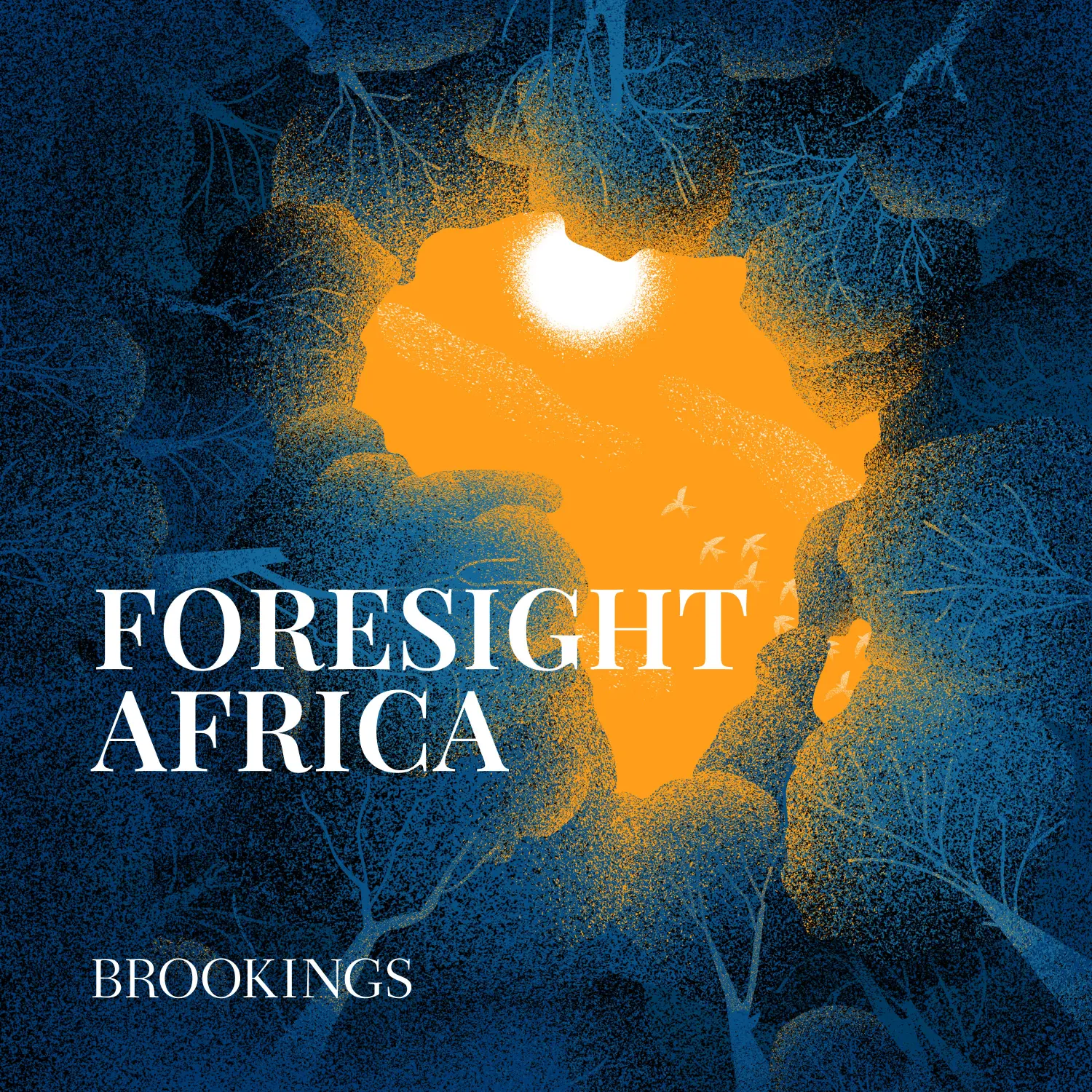
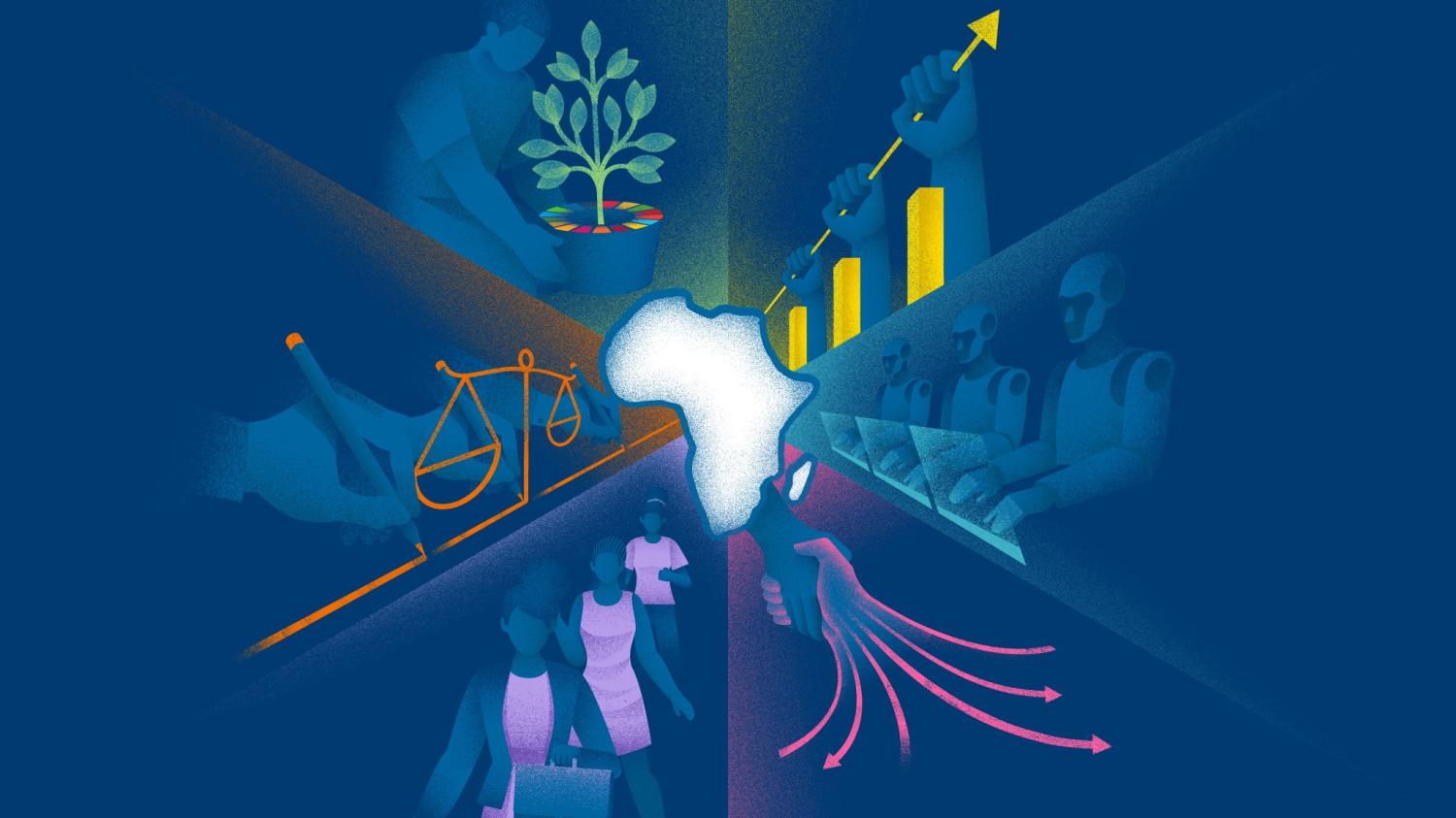
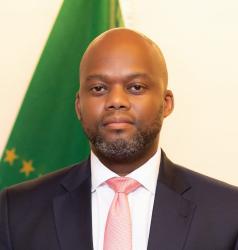

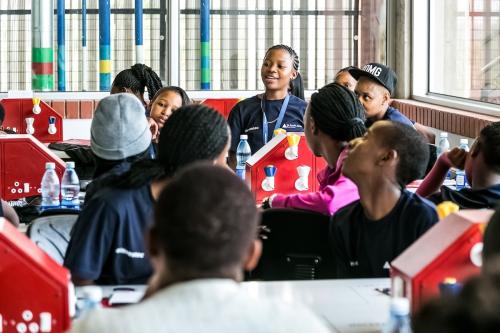
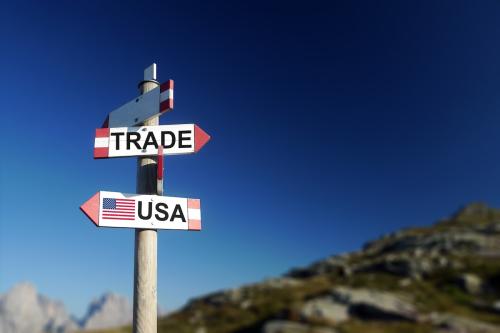
Commentary
PodcastThe African Continental Free Trade Area is a game changer for both African and global economies
Listen on
Foresight Africa Podcast
March 19, 2025